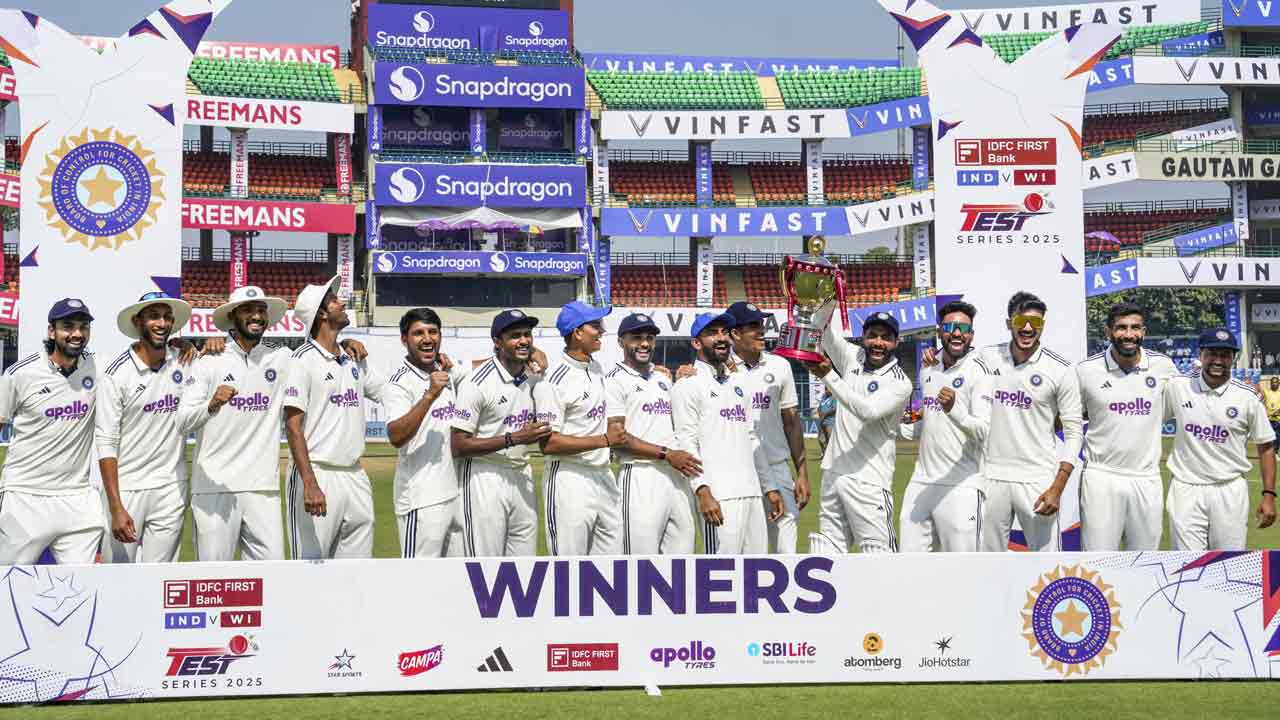NEW DELHI: The formalities barely took an hour as India secured a seven-wicket win over the West Indies in the second and final Test in New Delhi on Tuesday, completing a 2-0 series sweep. The hosts, markedly superior throughout, faced only a brief challenge towards the end.
The victory not only reaffirmed India's dominance at home but also marked Shubman Gill's first series triumph as India's Test captain.
𝐆𝐀𝐌𝐄. 𝐒𝐄𝐓. 𝐃𝐎𝐍𝐄 ✅
— BCCI (@BCCI) October 14, 2025
A comfortable 7️⃣-wicket victory for #TeamIndia in Delhi ✌️
With that they take the series 2️⃣-0️⃣ 🏆
Shubman Gill registers his first series win as Captain 👏
Scorecard ▶ https://t.co/GYLslRyLf8#INDvWI | @IDFCFIRSTBank pic.twitter.com/IwQFHmSQ5O
Chasing a modest target of 121, KL Rahul remained unbeaten on 58 off 108 balls, with Dhruv Jurel also not out on 6, guiding India to victory in 35.2 overs. Rahul struck six fours and two sixes, sharing a 79-run partnership for the second wicket with Sai Sudharsan, who contributed 39 runs.
The second Test stretched into the fifth morning, largely due to resistance from centurions John Campbell (115) and Shai Hope (103), along with a gritty 10th-wicket partnership. The Feroz Shah Kotla track offered little assistance to spinners, staying low and slow throughout.
📸📸
— BCCI (@BCCI) October 14, 2025
A day to cherish for #TeamIndia 🇮🇳
Scorecard ▶ https://t.co/GYLslRzj4G#INDvWI | @IDFCFIRSTBank pic.twitter.com/w6F6o8h5QY
Across the two Tests, Indian bowlers claimed all 40 West Indies wickets, with pacers performing admirably on unhelpful surfaces and spinners displaying patience when conditions turned docile at the Kotla.
On the batting front, India's top six were in fine form, producing five centuries and a near-90 across the two matches.
Record Alert! Mohammed Siraj becomes leading wicket-taker in Tests this year
Yet, when viewed in context, given that none of the West Indies top-order batters currently average even 35 in Test cricket, let alone 40 which is considered the benchmark, the gains, beyond the valuable World Test Championship points, appear limited.
5️⃣ wickets in the 1️⃣st innings 👌
— BCCI (@BCCI) October 14, 2025
3️⃣ wickets in the 2️⃣nd innings 👏
For his magical spells, Kuldeep Yadav bags the Player of the Match award in Delhi 🥇🫡
Scorecard ▶ https://t.co/GYLslRyLf8#TeamIndia | #INDvWI | @IDFCFIRSTBank | @imkuldeep18 pic.twitter.com/bkU7GqOILO
Adding to that, apart from Jayden Seales, most West Indian bowlers lacked substantial first-class experience. Seales, incidentally went wicket-less in the match with Jomel Warrican adding one wicket to the three he picked up in the first innings.
Despite the late spark shown by his side, Roston Chase became just the second West Indies captain to lose all his first five Tests as leader after Kraigg Brathwaite.
India's real test will come against South Africa, and if the first two days of the Pakistan-South Africa Test in Lahore are any indication, the turn and variable bounce at the Gaddafi Stadium is making quite a difference.
Out of the 16 wickets to fall across those two days, 15 have been claimed by spinners. That raises a pertinent question -- whether playing on flat batting tracks against a much stronger South African line-up would be a prudent choice.
A batting order featuring Aiden Markram, Ryan Rickelton, Wiaan Mulder, Dewald Brevis, Tristan Stubbs and Tony de Zorzi is several notches above this West Indies side. If Indian spinners struggled to dismiss a below-par Caribbean unit on a placid pitch, it could get trickier against the Proteas.
For head coach Gautam Gambhir, the scars of last year's home series whitewash against New Zealand still run deep. Yet, preparing rank turners remains a double-edged sword.
A master all-rounder! 🙌
— BCCI (@BCCI) October 14, 2025
6️⃣th Test ton!
8⃣ Wickets
Player of the Match in Ahmedabad 🏆
The ever-dependable Ravindra Jadeja is adjudged the Player of the Series! 🇮🇳
Scorecard ▶ https://t.co/GYLslRyLf8#TeamIndia | #INDvWI | @IDFCFIRSTBank | @imjadeja pic.twitter.com/gcYeQHtD5g
This Indian batting line-up, apart from KL Rahul and Ravindra Jadeja, is relatively young. However, both Yashasvi Jaiswal and Shubman Gill now possess enough experience to handle challenging surfaces.
It is worth remembering that the now retired Virat Kohli's Test average dipped during the phase when India regularly played on rank turners. But those same pitches helped Ravichandran Ashwin and Ravindra Jadeja evolve into world-beaters.
On less helpful tracks, neither Jadeja nor Washington Sundar -- both finger spinners -- appear half as threatening. Kuldeep Yadav, being a wrist spinner, remains a more potent option under such conditions.
The venues for the upcoming two-Test series against South Africa will, therefore, be crucial in assessing where India stand as a Test side at home -- especially with no red-ball cricket scheduled for the next eight months before the away series in Sri Lanka.
At Eden Gardens, the surface has rarely been a rank turner.
Traditionally, it offers assistance to seamers during the early and late hours of play but otherwise remains a good batting wicket where bowlers must work hard for success.
As for Barsapara Stadium in Guwahati, which will host its first-ever Test match, the element of the unknown remains -- both in terms of pitch behaviour and match dynamics.
(With PTI Inputs)

